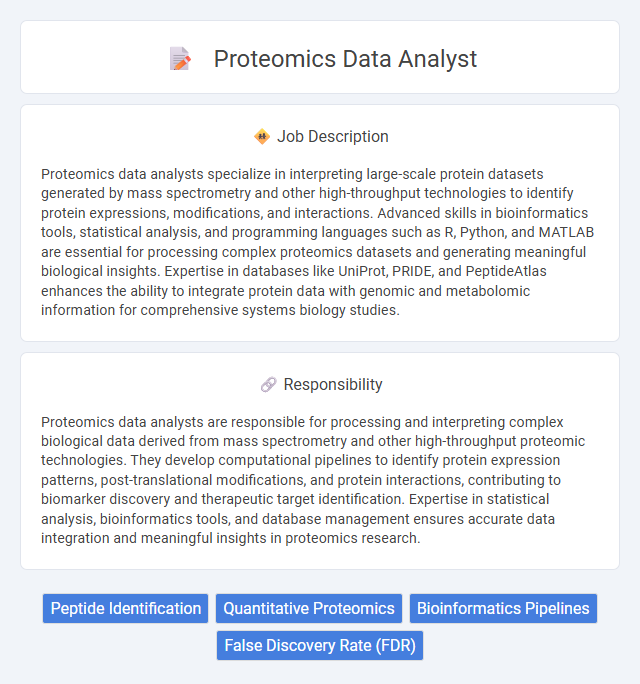
Proteomics data analysts specialize in interpreting large-scale protein datasets generated by mass spectrometry and other high-throughput technologies to identify protein expressions, modifications, and interactions. Advanced skills in bioinformatics tools, statistical analysis, and programming languages such as R, Python, and MATLAB are essential for processing complex proteomics datasets and generating meaningful biological insights. Expertise in databases like UniProt, PRIDE, and PeptideAtlas enhances the ability to integrate protein data with genomic and metabolomic information for comprehensive systems biology studies.
Individuals with strong analytical skills, attention to detail, and a background in biology or bioinformatics are likely suitable for a proteomics data analyst role. Those who enjoy working with large datasets and have proficiency in computational tools and statistical methods may find this job fulfilling. However, people who prefer less technical or less data-intensive tasks might struggle with the demands of this position.
Qualification
A Proteomics Data Analyst requires expertise in mass spectrometry data interpretation, bioinformatics tools, and statistical analysis software such as R and Python. Proficiency in databases like UniProt and knowledge of protein identification, quantitation methods, and post-translational modifications is essential. A strong background in molecular biology, analytical chemistry, or computational biology combined with experience in handling large-scale proteomics datasets ensures accurate data-driven insights.
Responsibility
Proteomics data analysts are responsible for processing and interpreting complex biological data derived from mass spectrometry and other high-throughput proteomic technologies. They develop computational pipelines to identify protein expression patterns, post-translational modifications, and protein interactions, contributing to biomarker discovery and therapeutic target identification. Expertise in statistical analysis, bioinformatics tools, and database management ensures accurate data integration and meaningful insights in proteomics research.
Benefit
Proteomics data analyst roles likely offer significant advantages such as the ability to work with cutting-edge bioinformatics tools and contribute to advancements in personalized medicine. Candidates probably benefit from opportunities to analyze extensive protein datasets that can lead to novel biomarker discoveries. This position may also provide a collaborative environment that fosters continuous learning and professional growth in the rapidly evolving field of proteomics.
Challenge
Proteomics data analyst roles likely involve managing large-scale, complex datasets generated by mass spectrometry and other high-throughput technologies, which can present significant challenges in data integration and interpretation. Analysts may face difficulties in developing accurate computational models to identify protein expressions and modifications amidst biological variability and technical noise. The evolving nature of proteomics technologies probably demands continuous learning and adaptation to new analytical tools and bioinformatics approaches.
Career Advancement
Proteomics data analysts with expertise in mass spectrometry, bioinformatics, and statistical analysis play a pivotal role in interpreting complex protein data for biomedical research and pharmaceutical development. Advancing in this career involves mastering emerging technologies like machine learning algorithms for protein structure prediction and gaining experience with multi-omics integration platforms. Leadership roles often require a strong foundation in computational biology, proficiency in programming languages such as Python and R, and the ability to translate proteomics insights into actionable biological strategies.
Key Terms
Peptide Identification
Proteomics data analysts specializing in peptide identification process complex mass spectrometry data to accurately detect and quantify peptides within biological samples. They utilize advanced bioinformatics tools and algorithms such as SEQUEST, Mascot, and MaxQuant to match spectral data against protein databases, ensuring high-confidence peptide assignments. Mastery in interpreting post-translational modifications and sequence variants enhances the reliability of proteomic profiles essential for biomarker discovery and functional protein analysis.
Quantitative Proteomics
Quantitative proteomics data analysts specialize in interpreting complex mass spectrometry datasets to identify and quantify proteins across biological samples. Expertise in statistical analysis, bioinformatics tools like MaxQuant and Perseus, and software programming languages such as R or Python is essential for optimizing data accuracy and reproducibility. This role supports biomedical research by enabling insights into protein expression changes related to diseases, drug responses, and biomarker discovery.
Bioinformatics Pipelines
Proteomics data analysts specialize in developing and optimizing bioinformatics pipelines to process and interpret large-scale mass spectrometry data for protein identification and quantification. Expertise in tools like MaxQuant, Proteome Discoverer, and Skyline enables efficient handling of complex datasets and integration with genomic and transcriptomic information. Proficiency in scripting languages such as Python and R is essential for automating workflows, statistical analysis, and visualization of proteomic profiles.
False Discovery Rate (FDR)
Proteomics data analysts specialize in interpreting complex protein datasets to identify biomarkers and understand biological processes, with a critical focus on controlling the False Discovery Rate (FDR) to ensure data reliability. They employ statistical methods and software tools to adjust for multiple hypothesis testing, minimizing false positives in peptide and protein identification. Expertise in FDR estimation enhances the accuracy of proteomic research outcomes, supporting advancements in disease diagnosis and therapeutic development.
 kuljobs.com
kuljobs.com